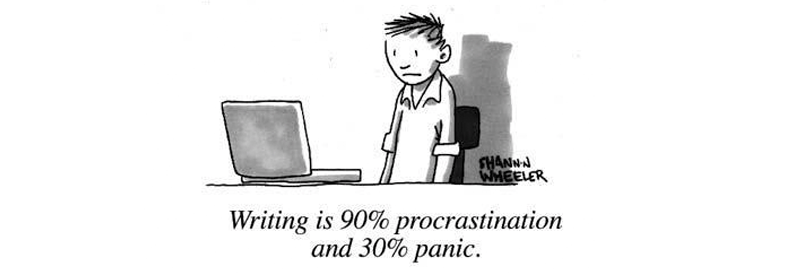Procrastination is the opposite of productivity. It is a work avoidance behavior that can have a myriad of underlying causes, mostly rooted in fear and a lack of confidence or an addiction to pressure or perfectionism. Procrastination is frustrating. It saps the will and the courage to just get started and the more prolonged it is, the more debilitating it becomes.
All writers suffer from procrastination to a certain degree; it is how you tackle that procrastination that makes the difference between putting off your writing project with endless excuses and having success.
And there are always excuses. You justify your lagging work ethic by telling yourself you’re putting off your writing until the right time comes along or your creative muse puts in an appearance.
Write Every Single Day: No Exceptions
Much akin to maintaining an exercise regimen, you need to set aside time daily to write; to keep those mental muscles flexed and in fine fettle even if you don’t produce the same quantity and quality of work every day. The important thing is that you show up and put in the time and your best effort. It’s a choice you’re constantly making: to watch TV or write; to clean your house or write; to check your emails or write.
If you’re looking to write for a living then you need to treat your writing as a career and not a hobby. To replace a habit of putting your writing off with a habit of productivity, you need to set up a structure within which your creativity can thrive.
Break Your Project Into Chunks
It helps if you break your writing project into manageable segments. Decide how many words you’d like to get done in a certain time period and use a timer if that helps you keep track. Once your time block is complete, take a break, walk around, make a cup of coffee, set up the next time block, and stick to it.
Know what time of the day you work best. Choose the time of day when you feel most awake and aware, and the time that makes the most sense considering other responsibilities you may have – for some it is first thing in the morning, for others in the afternoon or late at night.
Create a Productive Work Zone
Set up a distinct work zone and block out distractions; turn off your cell phone, Internet and email, anything that pulls your focus from your writing task. Background music or the radio can be a soothing companion but TV is a no-no as it’s too visually distracting. Inform your friends and family that unless it’s an emergency you’re not to be disturbed during your writing time.
Set Deadlines
Set deadlines and have a plan of what you’d like to accomplish during each day or writing period. Having an outline or blueprint of your story’s plot can only aid to order your thoughts. If it helps, have a writing group or buddy that you check in with weekly and report back to regarding your progress.
Defeating procrastination is about taking control of your talent. It is about self-discipline. No one else but you can actually complete your project; the responsibility falls firmly in your hands and it’s up to you whether you get that first draft or article done.
Once you get going, you’ll find that the actual process of writing is relaxing – it feels good to get to put pen to paper or see the words tumble onto the screen as you type. It may take some time to reach your ultimate writing level and it may be slow going at first but keep at it and you’ll soon find yourself to be a fully functioning writer.

